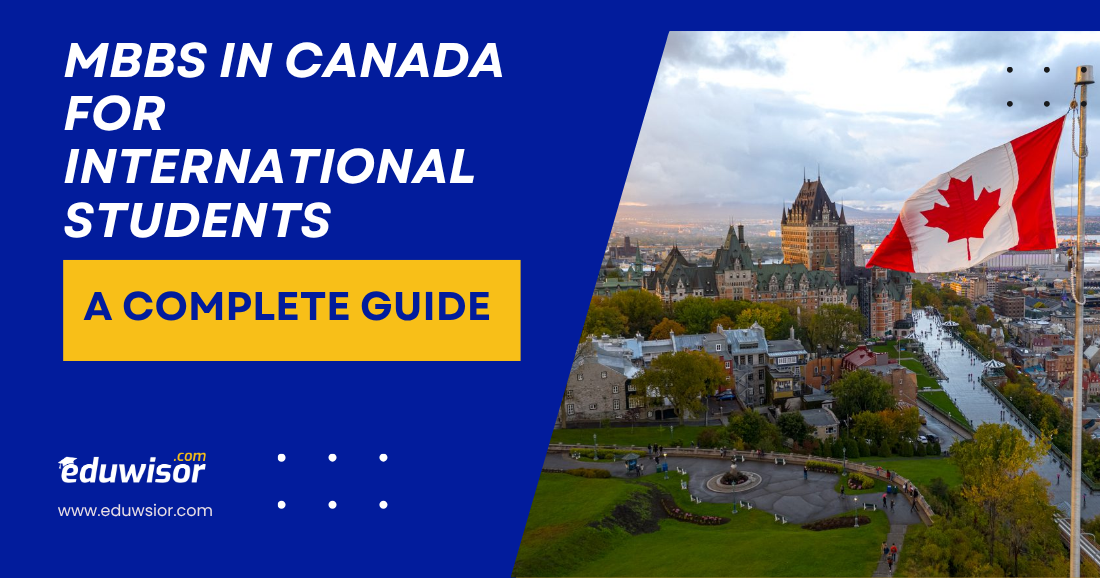Introduction
Pursuing an MBBS in Canada for international students is a dream for many aspiring doctors. Canada is renowned for its high-quality education, advanced healthcare system, and multicultural environment. However, the process of securing admission to a Canadian medical school can be competitive and complex.
This guide covers everything you need to know about studying MBBS in Canada, including eligibility, top universities, fees, scholarships, and career prospects.
Why Study MBBS in Canada?
Canada is a top destination for medical education due to:
✅ World-Class Universities – Institutions like the University of Toronto and McGill University rank among the best globally.
✅ Advanced Curriculum – Emphasis on research, clinical training, and hands-on experience.
✅ Global Recognition – Canadian medical degrees are respected worldwide.
✅ Post-Graduation Opportunities – High demand for doctors in Canada and abroad.
✅ Multicultural Environment – Welcoming atmosphere for international students.
Beyond these highlights, several other factors make studying MBBS in Canada a wise choice:
- Impeccable Research Facilities: Canadian universities are celebrated for their cutting-edge research infrastructure and high academic standards, setting students up for success in both clinical and research careers.
- Smooth Career Progression: Completing your MBBS in Canada can fast-track your journey to working in the country, with clear pathways to work permits and post-graduation employment.
- Globally Recognized Degrees: Medical degrees from Canadian institutions are acknowledged and valued worldwide, opening doors for international practice.
- Extensive Scholarships: Numerous scholarships and financial aid options are available to support international medical students, making quality education more accessible.
- No Language Barrier: With English as the primary language of instruction, international students can focus on their studies without linguistic hurdles.
In short, studying MBBS in Canada offers a blend of academic excellence, global opportunities, and a supportive international student community—making it an ideal destination for aspiring doctors.
Top Medical Schools in Canada for International Students
Here are the best universities offering MBBS (or equivalent MD programs) in Canada:
1. University of Toronto
- Program: MD (Doctor of Medicine)
- Duration: 4 years
- Highlights: Cutting-edge research, affiliated with top hospitals.
2. McGill University
- Program: MDCM (Doctor of Medicine & Master of Surgery)
- Duration: 4 years
- Highlights: Bilingual (English & French), strong clinical exposure.
3. University of British Columbia (UBC)
- Program: MD
- Duration: 4 years
- Highlights: Focus on rural and urban healthcare.
4. McMaster University
- Program: MD
- Duration: 3 years (accelerated)
- Highlights: Problem-based learning approach.
5. University of Alberta
- Program: MD
- Duration: 4 years
- Highlights: Strong research opportunities.
QS World University Rankings 2025: Canadian Medical Schools
When considering where to pursue your medical degree in Canada, global rankings can be a useful guide. According to the QS World University Rankings 2025, several Canadian universities stand out for their medical programs:
- University of Toronto – Ranked 14th globally, the University of Toronto consistently leads as Canada’s top medical school, renowned for its innovation and research excellence.
- McGill University – With a global ranking of 28, McGill maintains its reputation for academic rigor and a vibrant, bilingual campus experience.
- University of British Columbia (UBC) – UBC appears at 38, recognized for its commitment to both rural and urban healthcare training.
- McMaster University – Known for its unique problem-based approach, McMaster comes in at 41 on the list.
- University of Alberta – Ranked 86 globally, Alberta offers robust research opportunities and clinical exposure.
- Université de Montréal – Also listed at 86, this university is celebrated for French-language medical education and comprehensive medical curriculum.
- University of Ottawa – Claims the 124 spot, providing a strong academic foundation and diverse clinical placements.
- University of Calgary – Calgary ranks 132, especially noted for its three-year MD program and innovative teaching methods.
- Western University – Placed between 201–250, Western delivers a wide range of medical and health sciences programs.
- University of Waterloo – Coming in at 251, Waterloo is recognized for its interdisciplinary strengths and research in health sciences.
These rankings reflect the consistent quality and international reputation of Canadian medical schools, making them an excellent choice for international students seeking top-tier medical education.
Eligibility for MBBS in Canada
To apply for MBBS in Canada for international students, you must meet:
📌 Academic Requirements:
- High school diploma with Biology, Chemistry, and Physics.
- Bachelor’s degree (for MD programs, as Canada doesn’t offer direct MBBS after 12th).
📌 Entrance Exams:
- MCAT (Medical College Admission Test) – Required by most universities.
- IELTS/TOEFL – Proof of English proficiency.
📌 Other Requirements:
- Letters of recommendation.
- Personal statement.
- Interview (for shortlisted candidates).
Is NEET Required to Study MBBS in Canada?
If you’re an international student from India planning to pursue an MBBS (MD) in Canada, you’ll need to qualify for the NEET (National Eligibility cum Entrance Test). Most Canadian medical universities require Indian applicants to provide a valid NEET score along with other academic credentials and entrance exams like the MCAT. This helps to demonstrate that you meet the essential eligibility standards for medical programs both in India and abroad.
So, if you’re dreaming of attending institutions like the University of Toronto or McGill, be sure to add NEET to your admissions checklist.
Medical Courses in Canada After 12th (Apart from MBBS)
Not planning to head straight into an MBBS after high school? No problem—Canada has a wealth of medical-related diploma and certificate programs available to international students immediately after completing 12th grade.
These programs offer practical training and a pathway into the healthcare field without requiring a bachelor’s degree or sitting for the MCAT. Some popular options include:
- Diploma in Acupuncture – Focus on traditional and alternative healing methods.
- Pharmacy Technician Diploma – Learn the fundamentals of assisting pharmacists in community and hospital settings.
- Diploma in Paramedic – Hands-on training for emergency medical response.
- Cardiology Technologist Program – Specialized training for monitoring and assisting with cardiac care.
- Diploma in Holistic Nutrition – Explore the science of nutrition and wellness coaching.
You’ll also find shorter certificate programs such as:
- Dental Assistant Program – Support dentists in providing oral healthcare.
- Medical Device Reprocessing Technician – Learn sterilization and equipment management in hospitals.
- Animal Care Aid Certificate – Focused on basic animal health and care in veterinary clinics.
- Hospital Unit Coordinator Program – Prepares you to manage the administrative functions of hospital units.
- Human Psychology Certificate – Introductory study of psychology with practical applications.
These courses offer excellent exposure to the medical field and can open doors to further studies or immediate job opportunities in healthcare settings. Whether you want to step into clinical care or explore alternative health sciences, Canada has a range of options to match your interests and career goals.
MBBS in Canada Fees for International Students
Studying medicine in Canada is expensive, but worth the investment:
| University | Annual Tuition Fees (CAD) |
| University of Toronto | ~$96,000 |
| McGill University | ~$52,000 |
| University of British Columbia | ~$75,000 |
| McMaster University | ~$72,000 |
| University of Alberta | ~$60,000 |
💡 Additional Costs: Accommodation (~$10,000/year), health insurance, books, and living expenses.
Understanding MBBS Tuition Fees in Canada
The cost of studying MBBS in Canada for international students can vary significantly based on the university, its location, and the specifics of each program’s curriculum. Generally, the tuition fees for international students are higher than those for domestic students. It’s important to check the exact fee structure of your chosen university, as annual tuition can range anywhere from approximately CAD 14,750 up to CAD 91,760. This wide range reflects differences in university rankings, city living costs, and the resources each institution offers.
Budgeting for your studies should include not only tuition but also living expenses, which vary depending on the city. For example, living in Toronto or Vancouver may be pricier compared to smaller cities. Be sure to account for health insurance, transportation, and personal expenses in addition to the costs outlined above.Careful financial planning is essential to make the most of your medical education experience in Canada.
Scholarships for International Medical Students
To ease the financial burden, consider these scholarships:
🎓 University-Specific Scholarships (e.g., U of Toronto Scholarships)
🎓 Canadian Government Scholarships (e.g., Vanier Canada Graduate Scholarships)
🎓 External Grants (e.g., AMA Scholarships)
Eligibility Criteria for Major MBBS Scholarships in Canada
Looking to make your MBBS journey in Canada more affordable? Here’s a quick rundown of major scholarships for international medical students and what you’ll need to qualify:
- Lester B. Pearson International Scholarship – Open to students admitted to the University of Toronto, this merit-based award recognizes exceptional academic achievement and creativity.
- BrokerFish International Student Scholarship – Applicants are typically required to submit an essay on the value of health insurance for international students.
- Go Clean Scholarship – Generally, candidates submit an essay on a given topic related to sustainability or cleanliness.
- Outdoor Sports Scholarship – Eligibility often involves writing an in-depth essay (commonly around 3000 words) exploring the impact of sports or sporting equipment on human life.
- Education Future International Scholarship – Applicants need a minimum aggregate of 60% in both 10th and 12th grade examinations.
Be sure to review each scholarship’s official guidelines, as criteria may change yearly. Applying for multiple awards can improve your chances of offsetting tuition and living costs during your medical studies in Canada.
Admission Process for MBBS in Canada
- Research Universities – Choose the right medical school.
- Check Eligibility – Ensure you meet academic & language requirements.
- Prepare Documents – Transcripts, MCAT scores, recommendation letters.
- Apply via Official Portal – Submit before deadlines.
- Attend Interviews – If shortlisted.
- Get Visa Approval – Apply for a Canadian student visa.
Career Prospects After MBBS in Canada
After graduating, international students can:
👨⚕️ Practice in Canada – Clear the MCCQE (Medical Council of Canada Qualifying Exam).
🌍 Work Abroad – Canadian degrees are globally recognized.
🔬 Pursue Specializations – Residency programs in Canada or other countries.
Graduating with an MBBS (MD) from a Canadian university opens up a wide array of career opportunities in medicine, both within Canada and internationally. As an MBBS graduate, you may step into roles such as:
- General Practitioner
- Emergency Department Physician
- Obstetrician
- Physician
- Specialist (e.g., Cardiologist, Neurologist, Pediatrician)
With your skills and interests, you’ll find plenty of options—whether you want to work as a generalist or dive deeper into a specialty. Entry-level salaries for General Practitioners in Canada average around CAD 120,000 per year, and with experience or specialization, earnings can rise to CAD 240,000 or more annually.
Many graduates also choose to expand their horizons by pursuing advanced training, research, or clinical practice in other countries, thanks to the international recognition of Canadian medical degrees.
Can Students Work Part-Time While Studying Medicine in Canada?
Yes, international medical students in Canada are typically allowed to work part-time while pursuing their studies. As per Canadian regulations, you can work up to 20 hours per week during academic sessions, provided you hold a valid study permit that includes off-campus work authorization. This opportunity helps you gain valuable Canadian work experience and manage living expenses. Always check the specific conditions of your permit and your university’s guidelines to ensure compliance.
Is an MBBS Degree from Canada Recognized in India?
Yes, a medical degree (MD or MBBS equivalent) from a recognized Canadian university is valid in India. Indian authorities, including the Medical Council of India (now overseen by the National Medical Commission), accept Canadian medical degrees. However, if you wish to practice as a doctor in India, you’ll need to:
- Obtain an eligibility certificate from the National Medical Commission (NMC) before starting your studies in Canada.
- Successfully pass the Foreign Medical Graduates Examination (FMGE) upon returning to India.
- Complete any additional requirements set by Indian medical authorities.
Once these steps are fulfilled, you’ll be eligible to register and practice as a medical professional in India with a Canadian degree. This global recognition makes studying medicine in Canada an excellent choice for Indian students seeking international exposure and career flexibility.
Average Salary for MBBS Graduates in Canada
Salaries for medical graduates in Canada are quite attractive. As a newly qualified General Practitioner, you can expect to earn around CAD 120,000 per year on average. With additional experience and specialization, this figure can rise significantly—seasoned professionals often see annual earnings upwards of CAD 240,000. Your income will typically increase as you gain more expertise, pursue further training, or take on specialized roles within the healthcare sector.
Practicing Medicine in India After Completing MBBS in Canada
If you complete your MBBS (MD) in Canada and wish to practice medicine in India, there are a few important steps you’ll need to take:
- Degree Recognition: Your Canadian medical degree must be recognized by the National Medical Commission (NMC), formerly known as the Medical Council of India (MCI). Most Canadian medical schools are NMC-approved, but double-check their official list for confirmation.
- Screening Test: Indian students must pass the Foreign Medical Graduate Examination (FMGE), an eligibility exam conducted by the NBE (National Board of Examinations). This test is mandatory for all foreign-trained doctors wishing to practice in India.
- Internship Completion: After clearing the FMGE, you must undergo a one-year mandatory internship at an NMC-recognized hospital in India.
- Registration: Once you complete your internship, register with the State Medical Council or NMC to receive your license to practice as a doctor in India.
By fulfilling these requirements, Indian students with a Canadian MBBS can seamlessly begin their medical careers back home.
Conclusion
Pursuing an MBBS in Canada for international students opens doors to a prestigious medical career. While the admission process is competitive, proper planning and preparation can help you secure a seat in a top Canadian medical school.
Start your journey today by researching universities, preparing for entrance exams, and applying for scholarships!
Eduwisor always guides students toward the right path with an unbiased approach. You can follow us on Youtube, Facebook, Instagram, Twitter, and Linkedin. Stay tuned for regular updates.
Interested in applying? Contact authorized Eduwisor consultant for a smooth admission process!
Act NOW—limited seats for 2025 intake! Call/WhatsApp: 9326395883/ 9076036383
FAQs
Q: Can I study MBBS in Canada after 12th?
A: No, Canada requires a bachelor’s degree before applying to MD programs.
Q: Is the MCAT mandatory for MBBS in Canada?
A: Yes, most universities require MCAT scores.
Q: What is the duration of MBBS in Canada?
A: Typically 3-4 years for MD programs.
Q: Are there scholarships for international medical students?
A: Yes, many universities and organizations offer financial aid.
Popular Diploma and Short Medical Courses in Canada After 12th
If pursuing an MBBS isn’t your immediate goal, Canada offers a variety of diploma and short-term medical programs for students straight after the 12th. These options provide a pathway into the healthcare field without the lengthy commitment of a full medical degree.
Top Diploma Programs:
- Acupuncture
- Pharmacy Technician
- Paramedic Studies
- Cardiology Technology
- Holistic Nutrition
Short Medical Courses:
- Dental Assisting
- Human Psychology
- Medical Device Reprocessing
- Animal Care Support
- Hospital Unit Coordination
These courses are ideal for jumpstarting your medical career, offering valuable skills and knowledge in specialized healthcare areas. Diploma and certificate programs generally have shorter durations, lower costs, and offer excellent job prospects both in Canada and abroad.



